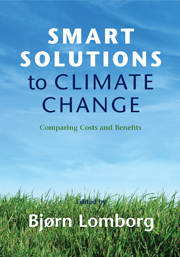Conclusion
Published online by Cambridge University Press: 05 June 2012
Summary
Reading the research in this volume – written by some of the top climate economists working in this field today – it is easier to understand why a single-minded focus on drastic carbon emission reductions has failed to work.
Of course, where it is possible to make relatively cheap reductions in carbon emissions through more efficient energy use it is a perfectly reasonable thing to do. However, Tol has starkly shown in chapter 2 that even a highly efficient global CO2 tax aimed at fulfilling the ambitious goal of keeping temperature increases below 2°C would reduce annual world GDP by a staggering amount – around 12.9%, or $40 trillion, in 2100. The total cost would be about fifty times that of the avoided climate damage. And if politicians choose less-efficient, less-coordinated cap-and-trade policies, the costs could escalate a further 10–100 times.
Thus, the Expert Panel has found that drastic carbon cuts would be the poorest way to respond to global warming. There are important implications for policy makers here. Although carbon taxes and a “cap-and-trade” scheme should, in theory, have very similar outcomes, the latter produces a much higher opportunity for “pork-barrel politics” and waste. So cap-and-trade schemes – which many politicians are considering implementing today – would be even less effective than taxes, possibly 10–100 times worse.
At the same time, Galiana and Green in chapter 7 have demonstrated that the magnitude of the energy technology challenge to climate stabilization is huge – much larger than is widely appreciated.
- Type
- Chapter
- Information
- Smart Solutions to Climate ChangeComparing Costs and Benefits, pp. 395 - 396Publisher: Cambridge University PressPrint publication year: 2010



